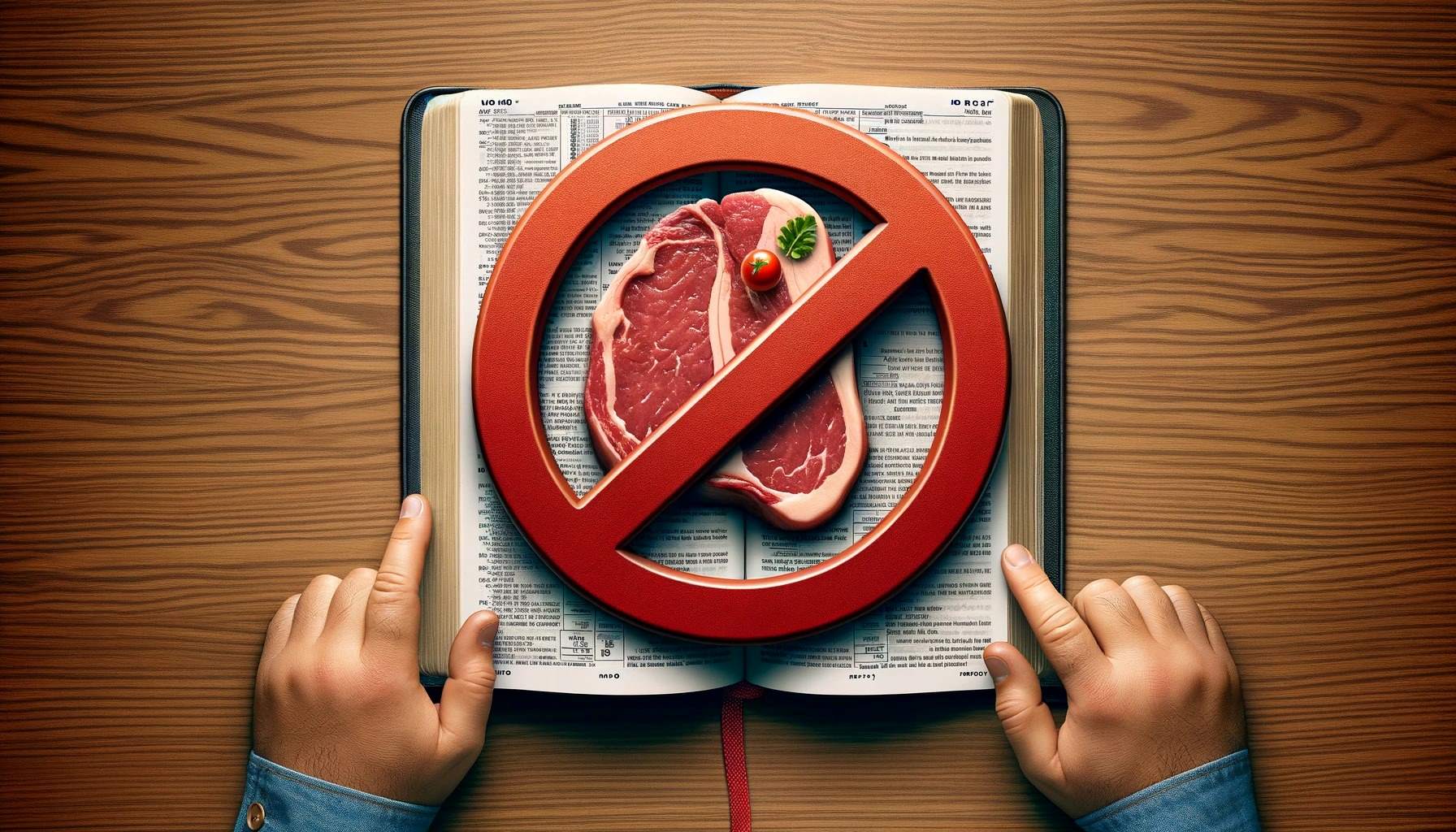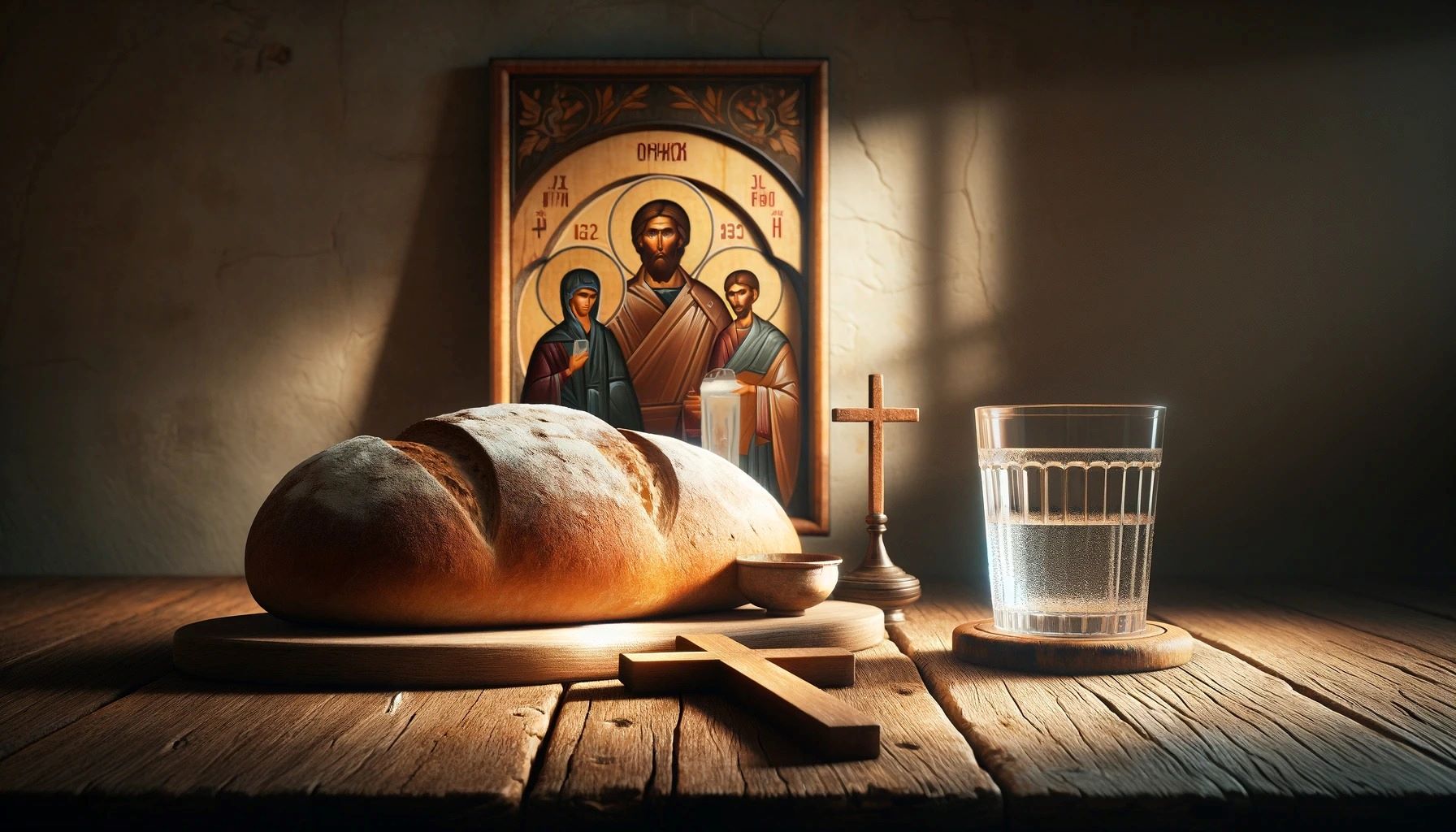Home>Special Themes>Where In The Bible Does It Say Not To Eat Meat On Fridays During Lent


Special Themes
Where In The Bible Does It Say Not To Eat Meat On Fridays During Lent
Published: February 28, 2024
Peter Smith, Editorial Director at Christian.net, combines deep insights into faith, politics, and culture to lead content creation that resonates widely. Awarded for his contributions to religious discourse, he previously headed a major organization for religious communicators, enhancing dialogue on faith's societal impacts.
Discover the biblical basis for abstaining from meat on Fridays during Lent and explore the significance of this special tradition. Learn more about special themes in the Bible.
(Many of the links in this article redirect to a specific reviewed product. Your purchase of these products through affiliate links helps to generate commission for Christian.net, at no extra cost. Learn more)
Table of Contents
Introduction
Where in the Bible does it say not to eat meat on Fridays during Lent? This question has puzzled many individuals, especially those who observe the Lenten season. Lent is a significant period in the Christian calendar, marked by fasting, prayer, and almsgiving. One of the traditional practices during Lent is abstaining from meat on Fridays. To understand the origins and biblical basis for this practice, it's essential to delve into the history of Lent and meat consumption, as well as explore the relevant biblical references and interpretations.
History of Lent and Meat Consumption
-
Lent, which originates from the Anglo-Saxon word "lencten" meaning spring, has been observed for centuries as a period of reflection and preparation for Easter, the most significant event in the Christian calendar. The practice of Lent can be traced back to the early church, where it was initially a time of fasting and spiritual discipline for new converts preparing for baptism.
-
The tradition of abstaining from certain foods, including meat, during Lent has evolved over time. In the early centuries of Christianity, fasting was a common practice, and the type of food abstained from varied among different regions and communities. However, the concept of Lenten fasting as we know it today began to take shape in the 4th century.
-
The Council of Nicaea in 325 AD played a pivotal role in standardizing the observance of Lent across the Christian world. It established the 40-day period of fasting to commemorate the 40 days Jesus spent in the wilderness. During this time, the consumption of meat was prohibited, and the diet was restricted to simple, non-animal products.
-
The association between Lent and meat consumption, particularly the abstinence from meat on Fridays, became more pronounced in the medieval period. This practice was not only a form of spiritual discipline but also a way to express solidarity with the less fortunate, as meat was considered a luxury at that time.
-
Over the centuries, the regulations regarding Lenten fasting and abstinence have undergone various revisions within different Christian denominations. However, the tradition of refraining from meat on Fridays during Lent has remained a common practice, especially within the Catholic Church and some other Christian traditions.
Biblical References to Fasting and Abstaining
-
Old Testament Fasting: The practice of fasting and abstaining from certain foods has deep roots in the Old Testament. In the book of Daniel, we find a prominent example of fasting as a form of spiritual discipline and seeking God's guidance. Daniel and his companions abstained from rich foods and wine, choosing a diet of vegetables and water for a period of time. This act of self-denial and reliance on God's provision serves as a biblical precedent for voluntary dietary restrictions for spiritual purposes.
-
Prophetic Call to Fasting: The prophet Isaiah, in the 58th chapter of the book of Isaiah, provides insight into the true nature of fasting and abstaining. Isaiah emphasizes that true fasting is not merely about abstaining from food but also about acts of justice, mercy, and compassion. This passage underscores the spiritual significance of fasting as a means of self-discipline and as a way to align oneself with God's will.
-
New Testament Fasting: The New Testament also contains references to fasting and abstaining. In the Gospel of Matthew, Jesus himself fasted for forty days and forty nights in the wilderness, setting an example for his followers. Additionally, Jesus taught about the importance of sincere and humble fasting, emphasizing the inward spiritual attitude rather than outward displays of piety.
-
Pauline Teachings on Fasting: The apostle Paul, in his letters to the Corinthians, encouraged believers to practice self-discipline and self-control, which could include periods of fasting and abstaining from certain foods. Paul's teachings highlight the voluntary nature of fasting and its role in nurturing spiritual growth and maturity.
-
Biblical Principles of Self-Denial: Throughout the Bible, the principles of self-denial, moderation, and discipline are emphasized as integral to the Christian life. Fasting and abstaining from certain foods serve as tangible expressions of these principles, allowing individuals to focus on their spiritual relationship with God and cultivate a deeper sense of dependence on Him.
The biblical references to fasting and abstaining provide a foundation for understanding the spiritual significance of dietary restrictions during Lent. These principles underscore the voluntary nature of fasting and abstaining, emphasizing the inward transformation of the heart and a sincere desire to draw closer to God.
Interpretations of Lenten Dietary Restrictions
The practice of abstaining from meat on Fridays during Lent has been subject to various interpretations within the Christian tradition. These interpretations stem from theological, historical, and cultural perspectives, shedding light on the significance of Lenten dietary restrictions.
-
Spiritual Discipline: One interpretation of Lenten dietary restrictions emphasizes the aspect of spiritual discipline. By voluntarily abstaining from certain foods, particularly meat, individuals engage in a form of self-denial and self-discipline. This practice is viewed as a way to detach from worldly comforts and redirect one's focus towards spiritual growth and reflection. It serves as a reminder of the sacrifices made by Jesus Christ and encourages believers to emulate his selfless nature.
-
Symbolism of Sacrifice: The act of abstaining from meat during Lent is often seen as a symbolic gesture of sacrifice. In the Christian faith, sacrifice holds profound significance, reflecting the ultimate sacrifice of Jesus on the cross. By giving up something as fundamental as meat, individuals symbolically participate in Christ's sacrifice and express their willingness to make personal sacrifices for the sake of their faith.
-
Solidarity with the Less Fortunate: Another interpretation of Lenten dietary restrictions revolves around solidarity with the less fortunate. Historically, meat was considered a luxury, and abstaining from it was a way for individuals to identify with those who could not afford such indulgences. This practice fosters empathy and compassion, prompting individuals to consider the needs of others and engage in acts of charity and generosity.
-
Renewal and Purification: Lenten dietary restrictions are also interpreted as a means of spiritual renewal and purification. By altering their dietary habits, individuals seek to purify their bodies and minds, preparing themselves for the spiritual significance of Easter. This period of abstinence is viewed as a time of cleansing and renewal, allowing believers to recommit themselves to their faith and deepen their relationship with God.
-
Cultural and Traditional Significance: The interpretations of Lenten dietary restrictions are often influenced by cultural and traditional factors. Different Christian denominations and cultural contexts may ascribe varying meanings to the practice of abstaining from meat. These interpretations are shaped by the historical development of Lenten observances within specific regions and communities, reflecting a rich tapestry of beliefs and customs.
The diverse interpretations of Lenten dietary restrictions underscore the multifaceted nature of this practice within the Christian tradition. Whether viewed as a form of spiritual discipline, a symbol of sacrifice, an expression of solidarity, a means of renewal, or a product of cultural heritage, the observance of Lenten dietary restrictions holds deep significance for many believers.
The Tradition of Meatless Fridays in Catholicism
The tradition of abstaining from meat on Fridays holds a prominent place within the Catholic Church, particularly during the Lenten season. This practice, rooted in centuries of tradition and theological significance, reflects the observance of penance, self-discipline, and solidarity with the sacrificial nature of Jesus Christ.
Read more: When Can You Not Eat Meat During Lent
Historical Foundation
The requirement to abstain from meat on Fridays has been a longstanding discipline within the Catholic Church. The origins of this tradition can be traced back to the early centuries of Christianity, where Friday, the day of Christ's crucifixion, held special significance as a day of penance and remembrance. The act of abstaining from meat on this day was seen as a way to honor the sacrifice of Jesus and unite with his suffering on the cross.
Theological Rationale
From a theological perspective, the tradition of meatless Fridays aligns with the concept of penitential observance. By voluntarily refraining from the consumption of meat, Catholics participate in a form of penance, acknowledging their own need for spiritual renewal and reconciliation. This act of self-denial is intended to foster a spirit of contrition and humility, leading believers to reflect on the redemptive sacrifice of Christ and their own need for repentance.
Connection to Lenten Observance
During the Lenten season, the practice of abstaining from meat on Fridays takes on added significance. Lent is a period of intensified spiritual devotion, marked by prayer, fasting, and almsgiving. The abstention from meat serves as a tangible expression of self-discipline and a reminder of the solemnity of the season. It also underscores the anticipation of Easter, the pinnacle of the Christian faith, by preparing the faithful through acts of penance and self-examination.
Contemporary Adaptations
In modern times, the Catholic Church has made adaptations to the practice of meatless Fridays, while still upholding the spirit of penitential observance. In 1966, the U.S. Conference of Catholic Bishops allowed for alternative forms of penance on Fridays outside of Lent, while still encouraging acts of self-denial and charity. This flexibility aimed to accommodate the diverse circumstances of Catholics while emphasizing the enduring value of penitential practices.
Symbolism and Spiritual Significance
The tradition of meatless Fridays in Catholicism carries rich symbolism and spiritual significance. It serves as a visible reminder of the sacrificial nature of the Christian faith, calling believers to embrace self-denial and unite with Christ's redemptive work. Additionally, the act of abstaining from meat fosters a sense of solidarity with the global community of believers, as they collectively engage in acts of penance and spiritual renewal.
Continuation of Tradition
Despite the adaptations and changes in practice, the tradition of meatless Fridays in Catholicism remains a cherished observance for many believers. It stands as a testament to the enduring legacy of penitential discipline and the profound connection between personal sacrifice and the redemptive mission of Jesus Christ. As Catholics continue to honor this tradition, they affirm their commitment to spiritual growth, self-discipline, and the timeless values of faith and devotion.
The tradition of meatless Fridays in Catholicism embodies the enduring spirit of penitential observance and serves as a poignant reminder of the sacrificial love exemplified by Jesus Christ. This practice continues to hold deep significance within the Catholic faith, uniting believers in a shared commitment to spiritual renewal and devotion.
Conclusion
In conclusion, the practice of abstaining from meat on Fridays during Lent is deeply rooted in the historical, biblical, and theological foundations of the Christian faith. While the specific directive to abstain from meat on Fridays during Lent may not be explicitly stated in the Bible, the principles of fasting, self-denial, and spiritual discipline find ample support in biblical teachings. The diverse interpretations of Lenten dietary restrictions reflect the multifaceted nature of this practice within the Christian tradition, encompassing themes of sacrifice, solidarity, renewal, and cultural significance.
The tradition of meatless Fridays in Catholicism, in particular, exemplifies the enduring commitment to penitential observance and the spiritual significance of self-denial. This practice serves as a tangible expression of solidarity with the sacrificial nature of Jesus Christ and fosters a spirit of contrition, humility, and anticipation of Easter. While adaptations have been made to accommodate contemporary circumstances, the tradition of meatless Fridays continues to resonate with believers, affirming their dedication to spiritual growth and devotion.
Ultimately, the observance of Lenten dietary restrictions, including abstaining from meat on Fridays, serves as a powerful reminder of the central themes of the Christian faith – sacrifice, redemption, and spiritual renewal. As believers engage in acts of self-discipline and reflection during the Lenten season, they are invited to deepen their connection with God, embody the values of compassion and solidarity, and prepare their hearts for the celebration of Easter.













